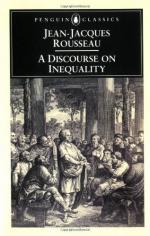|
This section contains 320 words (approx. 1 page at 400 words per page) |

|
Chapter 1, A Discourse on the Moral Effects of the Arts and Sciences, Part I Summary and Analysis
Jean-Jacques Rousseau's earliest Discourse asks about whether morality is purified or corrupted by the 'restoration of the arts and sciences'. Rousseau worries that it is hard to treat the subject properly. He begins by noting that mankind is coming into a new period of reason after many centuries, from Europe's "barbarism." This recovery has required a revolution. Science and art collapsed. However, in the revival, the arts and sciences can exist under government and the law. However, arts and sciences become despotic, stifling man's "original liberty" and causes people to love their slavery. It is this slavery, however, that makes them a civilized people.
Prior to art, men had a rude but natural morality. Human...
|
This section contains 320 words (approx. 1 page at 400 words per page) |

|




